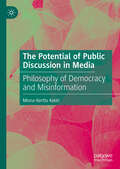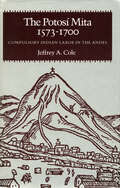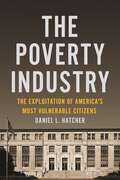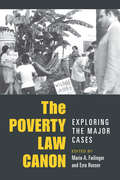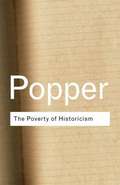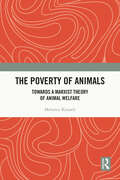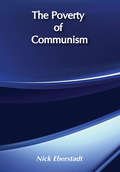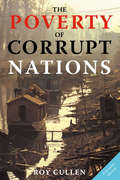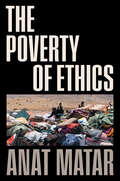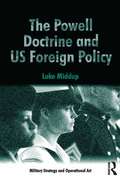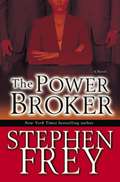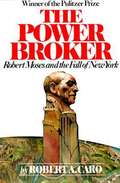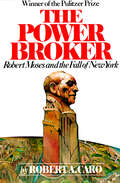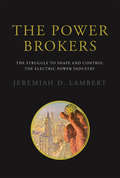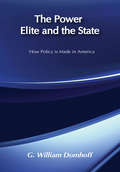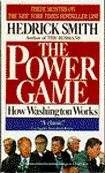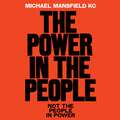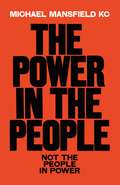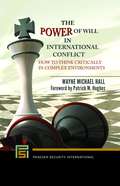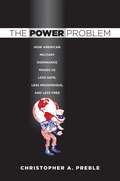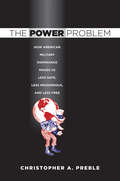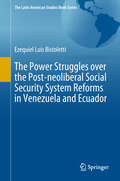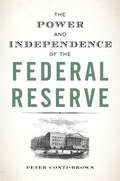- Table View
- List View
The Potential of Public Discussion in Media: Philosophy of Democracy and Misinformation
by Minna-Kerttu KekkiA friend recommended an interesting news article to you that changed your view on the topic. Later, you find out that the information in the article was false. Did you learn something, even though the information was not correct? From the subjective perspective at that moment, the answer is “yes,” but from the objective perspective, you were led false. “The Potential of Public Discussion in Media: Philosophy of Democracy and Misinformation,” takes up two perspectives on public discussions in media: the outsider’s third-person perspective and the first-person perspective of the engaged subject. By investigating public discussion in media through both perspectives, public discussion appears simultaneously both crucial and risky for democracy. The book uses phenomenology to frame the problematic of contemporary public discussions in media, which emphasizes the subjective experience of gaining new information.
The Potosí Mita, 1573-1700: Compulsory Indian Labor in the Andes
by Jeffrey A. ColePotosí, a mining center in what is now Bolivia, was the most productive source of silver in the Spanish American Empire between the mid-1500's and the late seventeenth century. Much of this success was attributable, at least initially, to the mita, a system of draft Indian labor instituted by Viceroy Francisco do Toledo in 1573 for the working of the silver mines and refineries. Bitter debate swirled around the mita during most of its 250-year history. It was assailed by its enemies as a form of servitude worse than slavery and accused of depopulating the provinces subject to it, yet it was supported by many, however reluctantly, who believed that the Spanish Empire depended on Potosí silver for its survival. The author traces the evolution of the mita from its inception to the end of the Hapsburg epoch in 1700. The primary focus is on the metamorphosis of the mita under the pressures of changing production realities at Potosí and demographic developments in the provinces from which the Indians were drafted. The author describes the role of native headmen (kurakas) in the system, the means used by Indians to evade service, and the efforts of the mining guild to tailor the mita to its needs. The secondary focus is on the Hapsburg government's administration of the mita, especially those factors that prevented the Crown or its viceroys from being fully effective.
The Poverty Industry: The Exploitation of America's Most Vulnerable Citizens (Families, Law, and Society #11)
by Daniel L HatcherHow funds for the needy are siphoned off for profit: &“A distressing picture of how states routinely defraud taxpayers of millions of federal dollars.&” ―Boston Review Government aid doesn&’t always go where it&’s supposed to. Foster care agencies team up with companies to take disability and survivor benefits from abused and neglected children. States and their revenue consultants use illusory schemes to siphon Medicaid funds intended for children and the poor into general state coffers. Child support payments for foster children and families on public assistance are converted into government revenue. And the poverty industry keeps expanding, leaving us with nursing homes and juvenile detention centers that sedate residents to reduce costs and maximize profit, local governments buying nursing homes to take the facilities&’ federal aid while the elderly languish with poor care, and counties hiring companies to mine the poor for additional funds in modern day debtor&’s prisons. In The Poverty Industry, Daniel L. Hatcher shows us how state governments and their private-industry partners are profiting from the social safety net, turning America&’s most vulnerable populations into sources of revenue and stealing billions. As policy experts across the political spectrum debate how to best structure government assistance programs, a massive siphoning of the safety net is occurring behind the scenes. In the face of these abuses of power, Hatcher offers a road map for reforms to realign the practices of human service agencies with their intended purpose, to prevent the misuse of taxpayer dollars—and ensure that aid truly reaches those in need. &“Meticulously researched . . . lifts the lid on a system that rather than helping the needy, systematically turns them into &‘a source of revenue.&’&” ―The Guardian &“Walks through the evolution of legal doctrine regarding rights of vulnerable persons [and] provides compelling evidence that scholars, policymakers, and advocates should take a closer look at the political and business relationships shaping contracting decisions involving for-profit firms.&” ―Political Science Quarterly
The Poverty Law Canon: Exploring the Major Cases
by Ezra Rosser Marie FailingerThe Poverty Law Canon takes readers into the lives of the clients and lawyers who brought critical poverty law cases in the United States. These cases involved attempts to establish the right to basic necessities, as well as efforts to ensure dignified treatment of welfare recipients and to halt administrative attacks on federal program benefit levels. They also confronted government efforts to constrict access to justice, due process, and rights to counsel in child support and consumer cases, social welfare programs, and public housing. By exploring the personal narratives that gave rise to these lawsuits as well as the behind-the-scenes dynamics of the Supreme Court, the text locates these cases within the social dynamics that shaped the course of litigation. Noted legal scholars explain the legal precedent created by each case and set the case within its historical and political context in a way that will assist students and advocates in poverty-related disciplines in their understanding of the implications of these cases for contemporary public policy decisions in poverty programs. Whether the focus is on the clients, on the lawyers, or on the justices, the stories in The Poverty Law Canon illuminate the central legal themes in federal poverty law of the late 20th century and the role that racial and economic stereotyping plays in shaping American law.
The Poverty Of Historicism
by Karl PopperKarl Popper's The Poverty of Historicism is a devastating criticism of the idea that there are fixed laws in history and that human beings are able to predict them. Popper dedicated the book to all those who fell victim to the fascist and communist belief in Inexorable Laws of Historical Destiny. It has inspired generations of intellectuals, policy makers and general readers alike. On its publication in 1957, it was hailed by Arthur Koestler as probably the only book published this year which will outlive the century.
The Poverty of Animals: Towards a Marxist Theory of Animal Welfare
by Mehmet KanatliThis book makes a theoretical contribution to animal rights issues from a Marxist perspective. Drawing on ethics, politics, and philosophy, it focuses on how to create a social formation that will improve animal welfare. Further, the book enables the readers to grasp current theoretical debates on animal welfare and to gain insight into theoretical and practical perspectives in dealing with the animal issues. The volume will be of great interest to scholars of politics and political philosophy, especially Marxism, and animal rights activists.
The Poverty of Communism
by Nicholas EberstadtOne third of the world's population today lives under governments that consider themselves to be Marxist-Leninist. In many of these places, severe poverty was endemic in the years before Communist authorities came to power. Communist governments claim to have a special understanding into and effectiveness in dealing with problems of poverty. Marxist-Leninist rulers have been in power for nearly thirty years in Cuba, nearly forty years in China, and over sixty-five years in the Soviet Union. How do the poor fare in such places today?Western intellectuals often assume there is an inevitable tradeoff between bread and freedom under communism. What populations lose in the way of civil and political rights, they gain in social guarantees that protect them against material hardship. In The Poverty of Communism, Nick Eberstadt challenges this assumption and shatters it. He shows that Communist governments in a wide variety of settings have been no more successful in attending to the material needs of the most vulnerable segments of the populations they govern than non-Communist governments against which they might most readily be compared. Indeed, measured by the health, literacy, and nutrition of their people, Communist governments may today be less effective in dealing with poverty than are non-Communist governments.The Poverty of Communism is a pathbreaking investigation. In a series of separate studies, Eberstadt analyzes the performance of Communist governments in the Soviet Union, Eastern Europe, China, and Cuba. This is the first scholarly effort to assess the record of Communist governments with respect to poverty in a detailed and comprehensive fashion. Well written, carefully argued, and reflecting a sweeping range of knowledge, The Poverty of Communism will be of interest to specialists in the countries investigated as well as those concerned with comparative economic and political development. Above all, it gives test
The Poverty of Corrupt Nations
by Roy CullenThe fight to eliminate world poverty is being severely hampered by corrupt leaders in developing countries. According to the African Union, some $150 billion is lost every year to corruption in Africa. In China, it is estimated corruption diminishes the annual value of gross domestic product by 15%. The pattern repeats itself elsewhere. This bleak situation compounds the poverty problem even more because donor countries are justifiably reluctant to support jurisdictions whose leaders are known to be corrupt, ignoring their citizens’ needs while stealing and laundering public funds for private use. What development does occur in chronically corrupt nations is often poorly planned and environmentally unsustainable, since the private gain of corrupt politicians and officials takes precedence over the implementation of sound development strategies. Likewise, bureaucratic corruption also results in the compromising of worker and consumer safety after all, a bribe costs less than obeying the law. And it is the poor who really pay the true cost of corruption. The Poverty of Corrupt Nations is a straightforward, easy-to-read exposition of the nature and scope of global corruption and money laundering, explaining the impact of recent troubling corruption trends on the public-at-large and public policy makers. Specifically, Cullen examines the links between world poverty, corruption, terrorism, global migration patterns, and money laundering. Constructively, Cullen then outlines a practical 20-point program to increase transparency and accountability in governments and parliaments around the world and break this cycle of corruption and poverty.
The Poverty of Ethics
by Anat MatarWhy the left should reclaim ethics and morality for itselfThe Poverty of Ethics stands the usual moral-political dichotomy on its head. It argues that moral principles do not in fact underlie or inform political decisions. It is, rather, the conceptual primacy of political discourse that rescues ethics from its poverty. Our ethical convictions receive their substance from historical narratives, political analyses, empirical facts, literary-educational models, political activity and personal experience. Yet morality, essentially, doesn&’t leave room for relativity: not every ethos deserves to be titles &‘moral&’. Hence the book argues further, it is the left ethos, as it has evolved over years, which forms the basis for ethics: morality is left-wing! Clarifying and justifying this seemingly odd statement is the main purpose of this essay. Appealing to philosophical ideas on the essence of language, on meaning, on understanding and persuasion, this book scrutinizes the system of concepts and attitudes informing our common view of the relationship between the moral and the political. It argues that the traditional conception of morality is far too narrow to form a basis for political thought and political action. Its carefully unfolded argument concludes that none of the current philosophical accounts of morality can be translated into terms of political will, much less into direct political action. Being too general and elastic, neither abstract moral principles, ethical-aesthetic sensibilities, nor the ethical demand emanating from an Other, can fulfill these tasks. Instead, the false primacy of the ethical over the political and the infinite flexibility of vacuous moral discourse are often mobilized to launder wrongs and delegitimize radical left politics. Gratification of the moral high ground becomes an implement of de-politicization, and thus a powerful political instrument in the hands of those seeking to shore up the existing order.
The Poverty of Philosophy
by Karl MarxThis is an answer to "The Philosophy of Poverty" by M. Proudhon.
The Powell Doctrine and US Foreign Policy (Military Strategy and Operational Art)
by Luke MiddupThe Vietnam War is one of the longest and most controversial in US history. This book seeks to explore what lessons the US military took from that conflict as to how and when it was appropriate for the United States to use the enormous military force at its disposal and how these lessons have come to influence and shape US foreign policy in subsequent decades. In particular this book will focus on the evolution of the so called ’Powell Doctrine’ and the intellectual climate that lead to it. The book will do this by examining a series of case studies from the mid-1970s to the present war in Afghanistan.
The Power Broker (Christian Gillette #3)
by Stephen FreyExposing high-level governmental corruption, conspiracy, and murder has garnered plenty of attention for Christian Gillette, the young dynamo chairman of the famous New York private equity firm Everest Capital. Now the reputation he has built taking Everest to the top has been noticed beyond the boardrooms of high finance, by powerful people with potentially devastating agendas. Christian's own attention is on Las Vegas, where he means to stake out a piece of the action by opening a new casino and launching an NFL franchise. But Sin City didn't get its nickname for nothing, and the mob soon makes it clear that Christian's company will have to pay if it wants to play in the nation's gaming capital. Christian has already taken on corporate pirates and cold-blooded assassins and lived to tell about it, but crossing the underworld could do more than just kill his brilliant career. It could crush his chance to fulfill his late father's political legacy. Dynamic U. S. senator Jesse Ford is the odds-on favorite to make history as the first black president. And the man he wants beside him in the red-hot race for the White House is Christian Gillette. But Samuel Hewitt, a Texas mogul with billions to burn, has another fate in mind for Christian: to be part of a shadow organization, powered by wealth and bound by dark secrets that has manipulated the course of American history for generations. As the pieces of Hewitt's plot fall into place, and a twisted chain of intrigue, treachery, blackmail, and death gets tighter and tighter, Christian realizes--maybe too late--that in a grudge match between kingmakers hell-bent on victory at all costs, he may be the last pawn sacrificed. With The Power Broker, bestselling author Stephen Frey unleashes an ever-accelerating thriller that breaks the suspense barrier--and never stops.
The Power Broker: Robert Moses and the Fall of New York
by Robert A. CaroThe Power Broker tells the hidden story behind the shaping (and mis-shaping) of twentieth-century New York (city and state) and makes public what few have known: that Robert Moses was, for almost half a century, the single most powerful man of our time in New York, the shaper not only of the city's politics but of its physical structure and the problems of urban decline that plague us today. In revealing how Moses did it--how he developed his public authorities into a political machine that was virtually a fourth branch of government, one that could bring to their knees Governors and Mayors (from La Guardia to Lindsay) by mobilizing banks, contractors, labor unions, insurance firms, even the press and the Church, into an irresistible economic force--Robert Caro reveals how power works in all the cities of the United States. Moses built an empire and lived like an emperor. He personally conceived and completed public works costing 27 billion dollars--the greatest builder America (and probably the world) has ever known. Without ever having been elected to office, he dominated the men who were--even his most bitter enemy, Franklin D. Roosevelt, could not control him--until he finally encountered, in Nelson Rockefeller, the only man whose power (and ruthlessness in wielding it) equalled his own.<P><P> Pulitzer Prize Winner
The Power Broker: Robert Moses and the Fall of New York
by Robert A. CaroPULITZER PRIZE WINNER • A modern American classic, this huge and galvanizing biography of Robert Moses reveals not only the saga of one man&’s incredible accumulation of power but the story of his shaping (and mis-shaping) of twentieth-century New York. One of the Modern Library&’s hundred greatest books of the twentieth century, Robert Caro's monumental book makes public what few outsiders knew: that Robert Moses was the single most powerful man of his time in the City and in the State of New York. And in telling the Moses story, Caro both opens up to an unprecedented degree the way in which politics really happens—the way things really get done in America's City Halls and Statehouses—and brings to light a bonanza of vital information about such national figures as Alfred E. Smith and Franklin D. Roosevelt (and the genesis of their blood feud), about Fiorello La Guardia, John V. Lindsay and Nelson Rockefeller. But The Power Broker is first and foremost a brilliant multidimensional portrait of a man—an extraordinary man who, denied power within the normal framework of the democratic process, stepped outside that framework to grasp power sufficient to shape a great city and to hold sway over the very texture of millions of lives. We see how Moses began: the handsome, intellectual young heir to the world of Our Crowd, an idealist. How, rebuffed by the entrenched political establishment, he fought for the power to accomplish his ideals. How he first created a miraculous flowering of parks and parkways, playlands and beaches—and then ultimately brought down on the city the smog-choked aridity of our urban landscape, the endless miles of (never sufficient) highway, the hopeless sprawl of Long Island, the massive failures of public housing, and countless other barriers to humane living. How, inevitably, the accumulation of power became an end in itself. Moses built an empire and lived like an emperor. He was held in fear—his dossiers could disgorge the dark secret of anyone who opposed him. He was, he claimed, above politics, above deals; and through decade after decade, the newspapers and the public believed. Meanwhile, he was developing his public authorities into a fourth branch of government known as "Triborough"—a government whose records were closed to the public, whose policies and plans were decided not by voters or elected officials but solely by Moses—an immense economic force directing pressure on labor unions, on banks, on all the city's political and economic institutions, and on the press, and on the Church. He doled out millions of dollars' worth of legal fees, insurance commissions, lucrative contracts on the basis of who could best pay him back in the only coin he coveted: power. He dominated the politics and politicians of his time—without ever having been elected to any office. He was, in essence, above our democratic system. Robert Moses held power in the state for 44 years, through the governorships of Smith, Roosevelt, Lehman, Dewey, Harriman and Rockefeller, and in the city for 34 years, through the mayoralties of La Guardia, O'Dwyer, Impellitteri, Wagner and Lindsay, He personally conceived and carried through public works costing 27 billion dollars—he was undoubtedly America's greatest builder. This is how he built and dominated New York—before, finally, he was stripped of his reputation (by the press) and his power (by Nelson Rockefeller). But his work, and his will, had been done.
The Power Brokers: The Struggle to Shape and Control the Electric Power Industry (The\mit Press Ser.)
by Jeremiah D. LambertHow the interplay between government regulation and the private sector has shaped the electric industry, from its nineteenth-century origins to twenty-first-century market restructuring.For more than a century, the interplay between private, investor-owned electric utilities and government regulators has shaped the electric power industry in the United States. Provision of an essential service to largely dependent consumers invited government oversight and ever more sophisticated market intervention. The industry has sought to manage, co-opt, and profit from government regulation. In The Power Brokers, Jeremiah Lambert maps this complex interaction from the late nineteenth century to the present day. Lambert's narrative focuses on seven important industry players: Samuel Insull, the principal industry architect and prime mover; David Lilienthal, chairman of the Tennessee Valley Authority (TVA), who waged a desperate battle for market share; Don Hodel, who presided over the Bonneville Power Administration (BPA) in its failed attempt to launch a multi-plant nuclear power program; Paul Joskow, the MIT economics professor who foresaw a restructured and competitive electric power industry; Enron's Ken Lay, master of political influence and market-rigging; Amory Lovins, a pioneer proponent of sustainable power; and Jim Rogers, head of Duke Energy, a giant coal-fired utility threatened by decarbonization. Lambert tells how Insull built an empire in a regulatory vacuum, and how the government entered the electricity marketplace by making cheap hydropower available through the TVA. He describes the failed overreach of the BPA, the rise of competitive electricity markets, Enron's market manipulation, Lovins's radical vision of a decentralized industry powered by renewables, and Rogers's remarkable effort to influence cap-and-trade legislation. Lambert shows how the power industry has sought to use regulatory change to preserve or secure market dominance and how rogue players have gamed imperfectly restructured electricity markets. Integrating regulation and competition in this industry has proven a difficult experiment.
The Power Elite and the State
by G. William DomhoffThis volume presents a network of social power, indicating that theories inspired by C.Wright Mills are far more accurate views about power in America than those of Mills's opponents.Dr. Domhoff shows how and why coalitions within the power elite have involved themselves in such policy issues as the Social Security Act (1935) and the Employment Act (1946), and how the National Labor Relations Act (1935) could pass against the opposition of every major corporation. The book descri bes how experts worked closely with the power elite in shaping the plansfor a post-World War II world economic order, in good part realized during the past 30 years. Arguments are advanced that the fat cats who support the Democrats cannot be understood in terms of narrow self-interest, and that moderate conservatives dominated policy-making under Reagan.
The Power Game: How Washington Works
by Hedrick Smith"May be the most sweeping and in many ways the most impressive portrait of the culture of the Federal Government to appear in a single work in many decides.... Knowledgeable and informative." THE NEW YORK TIMES BOOK REVIEW. Power is the name of the game. But until now, no one outside "the beltway" knew just who was wielding how much--and for what ends. Pulitzer Prize-winning, ex-Washington bureau chief of THE NEW YORK TIMES, Hedrick Smith, tells the whole story. From PACs to influence-peddling from the Pentagon to the WASHINGTON POST, THE POWER GAME reveals Congressional staffers more powerful than their bosses, media advisers more powerful than the media, and money that not only talks but threatens. It's all there, and it's all in here.
The Power In The People: How We Can Change The World
by Michael Mansfield'I want this book to inspire people, give them a blueprint for fighting their own battles, and challenge the status quo. To see that together, we are always stronger. To understand that those who stand in the way of change cannot do so forever.' Michael Mansfield, KCBarrister Michael Mansfield, KC, has spent his career fighting injustice, persecution and corruption. And be it the Birmingham Six, Bloody Sunday, Stephen Lawrence, the Marchioness, Hillsborough or Grenfell, he has come to learn one thing - that people power is unstoppable.Time and again he has witnessed governments, police forces, legal institutions and the establishment, try to block change and maintain the status quo in order to protect their interests. But almost every time he has seen that passion, perseverance, collectivity and courage create a powerful momentum which is increasingly difficult to stop.In this short but powerful book, the veteran barrister draws upon his 50 years of fighting for justice and revisits his most important cases and clients, proving without doubt that when people get together they can make lasting and positive change.The power is in the people - not the people in power.(p) 2023 Octopus Publishing Group
The Power In The People: How We Can Change The World
by Michael Mansfield'A lifetime spend fighting the powers that be and turning personal pain into collective power. Take care of this book because you are holding our history in your hands.' - LOWKEY'Michael Mansfield is the greatest civil liberties lawyer this country has ever produced' - Baroness HELENA KENNEDY of the Shaws KC'Michael Mansfield has given power to the voiceless, the innocents ... For this, he too is a hero' - JOHN PILGER'Michael Mansfield combines rare humanity with a brilliant understanding of the law' - JON SNOW'A book of great importance ... Mr Mansfield's thoughtful reflections demand our attention' - KEN LOACH'An impressive and inspiring read' - DUNCAN CAMPBELL 'I want this book to inspire people, give them a blueprint for fighting their own battles, and challenge the status quo. To see that together, we are always stronger. To understand that those who stand in the way of change cannot do so forever.' Michael Mansfield, KCBarrister Michael Mansfield, KC, has spent his career fighting injustice, persecution and corruption. And be it the Birmingham Six, Bloody Sunday, Stephen Lawrence, the Marchioness, Hillsborough or Grenfell, he has come to learn one thing - that people power is unstoppable.Time and again he has witnessed governments, police forces, legal institutions and the establishment, try to block change and maintain the status quo in order to protect their interests. But almost every time he has seen that passion, perseverance, collectivity and courage create a powerful momentum which is increasingly difficult to stop.In this short but powerful book, the veteran barrister draws upon his 50 years of fighting for justice and revisits his most important cases and clients, proving without doubt that when people get together they can make lasting and positive change.The power is in the people - not the people in power.
The Power In The People: How We Can Change The World
by Michael Mansfield'A lifetime spend fighting the powers that be and turning personal pain into collective power. Take care of this book because you are holding our history in your hands.' - LOWKEY'Michael Mansfield is the greatest civil liberties lawyer this country has ever produced' - Baroness HELENA KENNEDY of the Shaws KC'Michael Mansfield has given power to the voiceless, the innocents ... For this, he too is a hero' - JOHN PILGER'Michael Mansfield combines rare humanity with a brilliant understanding of the law' - JON SNOW'A book of great importance ... Mr Mansfield's thoughtful reflections demand our attention' - KEN LOACH'An impressive and inspiring read' - DUNCAN CAMPBELL 'I want this book to inspire people, give them a blueprint for fighting their own battles, and challenge the status quo. To see that together, we are always stronger. To understand that those who stand in the way of change cannot do so forever.' Michael Mansfield, KCBarrister Michael Mansfield, KC, has spent his career fighting injustice, persecution and corruption. And be it the Birmingham Six, Bloody Sunday, Stephen Lawrence, the Marchioness, Hillsborough or Grenfell, he has come to learn one thing - that people power is unstoppable.Time and again he has witnessed governments, police forces, legal institutions and the establishment, try to block change and maintain the status quo in order to protect their interests. But almost every time he has seen that passion, perseverance, collectivity and courage create a powerful momentum which is increasingly difficult to stop.In this short but powerful book, the veteran barrister draws upon his 50 years of fighting for justice and revisits his most important cases and clients, proving without doubt that when people get together they can make lasting and positive change.The power is in the people - not the people in power.
The Power Of Will In International Conflict: How To Think Critically In Complex Environments (Praeger Security International)
by Wayne HallWill has been--and always will be--the basis for succeeding in any conflict or competition. To win in a conflict or competition, decision-makers must comprehend the meaning and implications of will and successfully transform theories about it into practice. In the 21st century, it is especially important for military leaders and security professionals to comprehend will in sufficient depth to enable them to impose their will on other resisting entities and learn how to block or parry their adversaries' efforts to impose their will on them. This book will go a long way in helping decision-makers achieve these goals. <p><p> Each chapter in this book addresses one of 14 elements that will help readers to use will successfully over their adversaries: life-force, purpose, strength of motive, capabilities, determination, perseverance, sacrifice, passion, advantage, disadvantage, imposition, action, assessment, and adaptation. The book also provides readers with 18 considerations that will serve them well in all types of conflicts. This book will be particularly beneficial to decision-makers in the military, law enforcement, and business, as well as attorneys and judges.
The Power Problem: How American Military Dominance Makes Us Less Safe, Less Prosperous, and Less Free
by Christopher A. PrebleNumerous polls show that Americans want to reduce our military presence abroad, allowing our allies and other nations to assume greater responsibility both for their own defense and for enforcing security in their respective regions. In The Power Problem, Christopher A. Preble explores the aims, costs, and limitations of the use of this nation's military power; throughout, he makes the case that the majority of Americans are right, and the foreign policy experts who disdain the public's perspective are wrong. <p><p> Preble is a keen and skeptical observer of recent U.S. foreign policy experiences, which have been marked by the promiscuous use of armed intervention. He documents how the possession of vast military strength runs contrary to the original intent of the Founders, and has, as they feared, shifted the balance of power away from individual citizens and toward the central government, and from the legislative and judicial branches of government to the executive. In Preble's estimate, if policymakers in Washington have at their disposal immense military might, they will constantly be tempted to overreach, and to redefine ever more broadly the "national interest." <p> Preble holds that the core national interest―preserving American security―is easily defined and largely immutable. Possessing vast military power in order to further other objectives is, he asserts, illicit and to be resisted. Preble views military power as purely instrumental: if it advances U.S. security, then it is fulfilling its essential role. If it does not―if it undermines our security, imposes unnecessary costs, and forces all Americans to incur additional risks―then our military power is a problem, one that only we can solve. As it stands today, Washington's eagerness to maintain and use an enormous and expensive military is corrosive to contemporary American democracy.
The Power Problem: How American Military Dominance Makes Us Less Safe, Less Prosperous, and Less Free (Cornell Studies in Security Affairs)
by Christopher A. PrebleNumerous polls show that Americans want to reduce our military presence abroad, allowing our allies and other nations to assume greater responsibility both for their own defense and for enforcing security in their respective regions. In The Power Problem, Christopher A. Preble explores the aims, costs, and limitations of the use of this nation's military power; throughout, he makes the case that the majority of Americans are right, and the foreign policy experts who disdain the public's perspective are wrong. Preble is a keen and skeptical observer of recent U.S. foreign policy experiences, which have been marked by the promiscuous use of armed intervention. He documents how the possession of vast military strength runs contrary to the original intent of the Founders, and has, as they feared, shifted the balance of power away from individual citizens and toward the central government, and from the legislative and judicial branches of government to the executive. In Preble's estimate, if policymakers in Washington have at their disposal immense military might, they will constantly be tempted to overreach, and to redefine ever more broadly the "national interest." Preble holds that the core national interest—preserving American security—is easily defined and largely immutable. Possessing vast military power in order to further other objectives is, he asserts, illicit and to be resisted. Preble views military power as purely instrumental: if it advances U.S. security, then it is fulfilling its essential role. If it does not—if it undermines our security, imposes unnecessary costs, and forces all Americans to incur additional risks—then our military power is a problem, one that only we can solve. As it stands today, Washington's eagerness to maintain and use an enormous and expensive military is corrosive to contemporary American democracy.
The Power Struggles over the Post-neoliberal Social Security System Reforms in Venezuela and Ecuador (The Latin American Studies Book Series)
by Ezequiel Luis BistolettiThis book carries out a comparative analysis of the power struggles over the post-neoliberal social security reforms in Venezuela and Ecuador. The research breaks down why the social security system reform initiated by Hugo Chávez’ government in Venezuela has come down since its passing in 2002, whereas the social security system reform initiated by Rafael Correa’s government in Ecuador has come along in spite of the obstacles since 2007. All in all, the analysis determined that the struggles over the social security system reforms in both countries remarkably corresponded to each other with regard to their structural conditions, points of contention, and contending actors. In contrast, the analysis established substantial divergences regarding the ways in which the struggles over both reforms came about, due to the divergent development of the struggles for hegemony between government and opposition. These divergences finally brought about the indefinite stagnation of the reform in Venezuela and the advancement of subsequent partial reforms aimed at the universalization of social security in Ecuador.
The Power and Independence of the Federal Reserve
by Peter Conti-BrownThe independence of the Federal Reserve is considered a cornerstone of its identity, crucial for keeping monetary policy decisions free of electoral politics. But do we really understand what is meant by "Federal Reserve independence"? Using scores of examples from the Fed's rich history, The Power and Independence of the Federal Reserve shows that much common wisdom about the nation's central bank is inaccurate. Legal scholar and financial historian Peter Conti-Brown provides an in-depth look at the Fed's place in government, its internal governance structure, and its relationships to such individuals and groups as the president, Congress, economists, and bankers. Exploring how the Fed regulates the global economy and handles its own internal politics, and how the law does--and does not--define the Fed's power, Conti-Brown captures and clarifies the central bank's defining complexities. He examines the foundations of the Federal Reserve Act of 1913, which established a system of central banks, and the ways that subsequent generations have redefined the organization. Challenging the notion that the Fed Chair controls the organization as an all-powerful technocrat, he explains how institutions and individuals--within and outside of government--shape Fed policy. Conti-Brown demonstrates that the evolving mission of the Fed--including systemic risk regulation, wider bank supervision, and as a guardian against inflation and deflation--requires a reevaluation of the very way the nation's central bank is structured. Investigating how the Fed influences and is influenced by ideologies, personalities, law, and history, The Power and Independence of the Federal Reserve offers a clear picture of this uniquely important institution.
